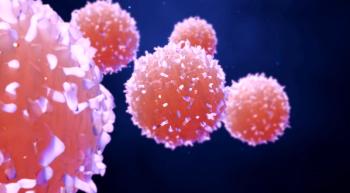
A preclinical study showed that FGL2 protein suppression may stop tumor cell growth in patients with glioblastoma.

Brielle Benyon, Assistant Managing Editor for CURE®, has been with MJH Life Sciences since 2016. She has served as an editor on both CURE and its sister publication, Oncology Nursing News. Brielle is a graduate from The College of New Jersey. Outside of work, she enjoys spending time with family and friends, CrossFit and wishing she had the grace and confidence of her toddler-aged daughter.
Follow Brielle on Twitter @Brielle_Benyon.

A preclinical study showed that FGL2 protein suppression may stop tumor cell growth in patients with glioblastoma.

President Donald J. Trump announced his plan to amp up the fight against childhood cancer, and to lower prescription drug costs.

From World Cancer Day to top performers and athletes, here is a quick overview of what is making headlines in the cancer space.

Maria Falzone won't let her diagnosis of advanced cholangiocarcinoma stifle her sense of humor.

Only about 4 percent of adults with cancer are treated on clinical trials, according to one expert. Yet, those results are then applied to everybody.

One expert discusses how cancer and its treatments can have many lasting side effects on patients, from depression to peripheral neuropathy.

Certain factors – such as diastolic blood pressure and fasting insulin – were found to be associated with renal cell carcinoma.

Loneliness may play a key role in an individual’s social constraints following a cancer diagnosis and its treatment, which in turn, may worsen symptom burden, according to recent research.

Here’s a resource for what FDA decisions mean – and how they affect patients.

In this week's episode of the CURE Talks Cancer podcast, hear from some of our recent MPN Heroes.

Multiple myeloma is a type of blood cancer that originates in the bones. Here’s what you need to know about the disease.

Patients with cancer who have other health issues are less likely to have discussions about – and participate in – clinical trials.

People who have experienced high exposures to gasoline might be at an increased risk for kidney cancer, according to recent research.

Treatment side effects are typically manageable for patients with metastatic kidney cancer, but patients must have open communication with their health care team about them.

Certain groups of pediatric and adolescent patients are less likely to receive fertility preservation consultation, recent research says.

Recent research found that outpatient palliative care improved survival and quality of life in patients with advanced cancer.

In conjunction with Cervical Cancer Awareness Month, recognized in the month of January, here are some fast facts about the disease.

Next-generation sequencing and personalized approaches will continue to improve cancer outcomes. But there’s still much work to be done.

The Food and Drug Administration (FDA) approved Sprycel (dasatinib) plus chemotherapy for the treatment of pediatric patients with newly diagnosed Philadelphia chromosome-positive acute lymphoblastic leukemia

An expert discusses the current landscape – as well as future prospects – for immunotherapy in lung cancer.

Inhibiting the immune system could decrease cognitive decline after radiation treatment, according to research conducted in mouse models.

A web-based intervention may help reduce harmful UV exposure and skin cancer risk in young adults, according to recent research.

The Food and Drug Administration approved Asparlas (calaspargase pegol-mknl) as a component of a chemotherapy regimen to treat adult and pediatric patients with acute lymphoblastic leukemia (ALL), according to the agency.

In this week’s episode of CURE Talks Cancer, we sit down with Evan and hear about his cancer journey and the path he took to get back on stage.

This is the first approval of a PARP inhibitor as a first-line maintenance treatment for BRCA-mutant gynecologic cancers.

The Food and Drug Administration (FDA) approved BRACAnalysis CDx to be used to identify patients with advanced ovarian cancer who have germline BRCA mutations and are eligible for first line treatment with Lynparza (olaparib) after responding to platinum-based chemotherapy.

Patients with myeloma who took higher doses of Kyprolis plus dexamethasone tended to have better survival outcomes, according to a recent study.

A person’s relationship with food can change after a cancer diagnosis, stirring up feelings of anxiety. A recent seminar discussed strategies that can help.

Here’s another throwback to one of our 2008 issues, where genetic testing was just gaining steam in the cancer space.

More than 40 percent of patients with a myeloproliferative neoplasm reported that they were unsatisfied with their current pain management strategy.